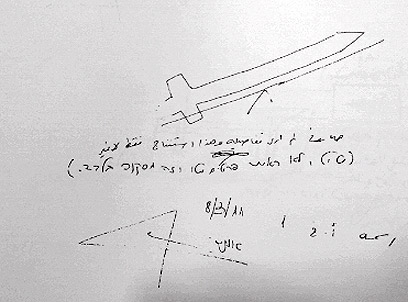
Hamas engineer Dirar Abu Sisi, nabbed by Israeli security forces earlier this year, provided interrogators with priceless information on Hamas' modus operandi, the terror group's readiness for a clash with Israel and attempts to improve its rocket range.
- Receive Ynetnews updates
directly to your desktop
According to interrogation excerpts, cleared for publication Thursday by the Beersheba District Court following Ynet's appeal, the Hamas engineer described the terror group as an orderly hierarchical organization that aims to learn from its mistakes and adapt to changing regional realities.

Hamas' Abu Sisi (Photo: Herzl Yosef)
The engineer told interrogators that following Operation Cast Lead Gaza, top Hamas terrorist Mohammed Deif and the group's military wing commander Ahmed Jabari found Hamas' operations to be lacking and decided to make Abu Sisi in charge of establishing the organization's new military academy.
"An analysis of the war with Israel was undertaken. It found that a large number of Hamas activists ran away from their positions. A failure occurred in decision-making coupled with an inability to use arms during the battle – because of fear," he said. "A program of study had to be created, in order to improve the situation."
Terror studies at mosques
The new academy was tasked with imparting combat methods and tactics to Hamas terrorists, Abu Sisi said. Hamas men were undertaking their studies at mosques, while passing their final exams in known Gaza universities or in mosques.
"The books and academic materials did not bear the Hamas name or logo," he said. Instructors include university lecturers, education ministry officials, merchants and others.

One of Abu Sisi's rocket diagrams (Photo: Ilana Curiel)
Abu Sisi is believed to be Hamas' rocket expert. He joined the terror group in 2002, despite working for the Palestinian Electric Company, which forbade its employees from joining any group.
"I assisted Hamas in developing their missile capabilities, by identifying and handing over mathematical equations that improve the metal pipe's ability to withstand pressure and heat," he said. "I was present when a missile was test-fired at the sea in Khan Younis."
The terror group was lacking materials that could improve their rocket range and later smuggled it in from Egypt through tunnels, he said.
Rocket info on the Internet
Abu Sisi's interrogation revealed that he acquired plenty of information on improving rocket range via the Internet, including the YouTube website.
"I know nothing about explosives. I only calculated the pressure and heat…I downloaded the formula from the Internet," he said, adding that he also downloaded software pertaining to the rocket's structure.
Hamas would send its activists for further instruction overseas, Abu Sisi said. Selected graduates of the academy reached military academies in foreign countries, he said, including Syria, Yemen, Sudan and Iran.
During his interrogation, Abu Sisi expressed his regret for joining Hamas.
"I greatly regret my affiliation with the Muslim Brotherhood and Hamas Movement, my work to develop the missile range, my part in establishing Hamas' military academy, and all the information I handed over to Hamas that can threaten the security of Israel and its citizens," he said.
"I know the missiles are lethal and take the lives of others, without distinguishing between Arabs and Jews," he said.
Abu Sisi was kidnapped in Kiev and brought to Israel in February. His indictment sheet comprises nine counts, including membership in a terror organization, murder, attempted murder and arms production.
- Follow Ynetnews on Facebook















